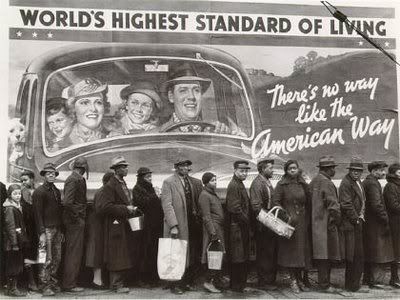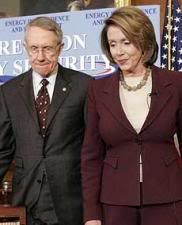As David Swanson noted on Wednesday:
You may have heard that our center-right nation got enthusiastic, formed a grassroots movement called a tea party, and overwhelmingly voted in a more rightwing party, sending hordes of nasty socialists packing as a result of their overly progressive performance, meaning gridlock between the righteous Congress and the infidel president for the next two years. There are some problems with this story, beginning with the fact that it’s completely false.
[snip]
As Karen Dolan blogged about immediately after Tuesday’s elections, members of the Congressional Progressive Caucus — over 80 members — lost only 3 seats. The Cut-Spending-Except-For-Killing Blue Dogs had 54 members and lost 26 of them, and those 26 were their true believers. Congress members, including one or two real progressives, didn’t lose by being progressive but by being Democrats. Alan Grayson was defeated by the largest investment of corporate money in any House race, but the obedient corporatist Democrat in the next district over lost too. And this was despite the Democratic Party funding and supporting the Blue Dogs, leaving the progressives to raise their own money.Tea Party candidates, in contrast to progressives, did not have a successful day on Tuesday. Their nominees’ craziness cost the Republican Party control of the Senate. Yet the whole corporate-funded smoke-and-mirrors “movement” of the Tea Party pushed the Republican Party as a whole to the right, in a way that no well-funded institution has pushed the Democrats to the left or even tried to. And this is the key lesson: pushing the Democrats to the left would save them from themselves.
On Thursday Amy Goodman at Democracy Now spoke with CPC Co-Chair Raul Grijalva about the CPC not only holding it’s own with a loss of only 4 seats in the mid terms, but coming out of the elections holding the relative largest plurality of all groups in Congress.
The Democrats lost the majority in the US House of Representatives in Tuesday’s midterm elections, but what is the makeup of the new Democratic House caucus? The conservative Blue Dogs lost half their members, while the Progressive Caucus remains near eighty. We speak to its co-chair, Rep. Raúl Grijalva, who appears to have retained his seat in a close election in Arizona’s 7th Congressional District. Over the past year, Grijalva has received numerous threats, including having a suspicious package covered in swastikas sent to his office and having a bullet shot through his district office in Yuma, Arizona.
Democracy Now – November 04, 2010
about 10 minutes
..transcript follows..

 Rob Johnson is the Director of the Economic Policy Initiative at the Franklin and Eleanor Roosevelt Institute and is a regular contributor to the Institute’s blog NewDeal2.0. He serves on the UN Commission of Experts on Finance and International Monetary Reform. Previously, Dr. Johnson was a Managing Director at Soros Fund Management where he managed a global currency, bond and equity portfolio specializing in emerging markets. He was also a Managing Director at the Bankers Trust Company. Dr. Johnson has served as Chief Economist of the US Senate Banking Committee under the leadership of Chairman William Proxmire and was Senior Economist of the U.S. Senate Budget Committee under the leadership of Chairman Pete Domenici. Dr. Johnson was an Executive Producer of Taxi to the Dark Side, an Oscar Winning documentary produced and directed by Alex Gibney.
Rob Johnson is the Director of the Economic Policy Initiative at the Franklin and Eleanor Roosevelt Institute and is a regular contributor to the Institute’s blog NewDeal2.0. He serves on the UN Commission of Experts on Finance and International Monetary Reform. Previously, Dr. Johnson was a Managing Director at Soros Fund Management where he managed a global currency, bond and equity portfolio specializing in emerging markets. He was also a Managing Director at the Bankers Trust Company. Dr. Johnson has served as Chief Economist of the US Senate Banking Committee under the leadership of Chairman William Proxmire and was Senior Economist of the U.S. Senate Budget Committee under the leadership of Chairman Pete Domenici. Dr. Johnson was an Executive Producer of Taxi to the Dark Side, an Oscar Winning documentary produced and directed by Alex Gibney. The biggest mistake I see many make when trying to sell the Democrats is to call the prospects stupid, and tell them buying the product is the only way they can stop being stupid, apparently thinking the prospects will immediately reach for their wallets and say “where do I sign”?
The biggest mistake I see many make when trying to sell the Democrats is to call the prospects stupid, and tell them buying the product is the only way they can stop being stupid, apparently thinking the prospects will immediately reach for their wallets and say “where do I sign”? There is, I suppose, a remote possibility that Obama and the democrats might finally wake up and realize they need the independent and liberal votes they’ve thrown away since inauguration day last year, and that all the corporate donations in the world aren’t going to save them without those votes, and start producing some useful progressive legislation and pass it in time for the midterms.
There is, I suppose, a remote possibility that Obama and the democrats might finally wake up and realize they need the independent and liberal votes they’ve thrown away since inauguration day last year, and that all the corporate donations in the world aren’t going to save them without those votes, and start producing some useful progressive legislation and pass it in time for the midterms. Creating and passing a universal single payer health care bill for example might do it all by itself, for example.
Creating and passing a universal single payer health care bill for example might do it all by itself, for example.